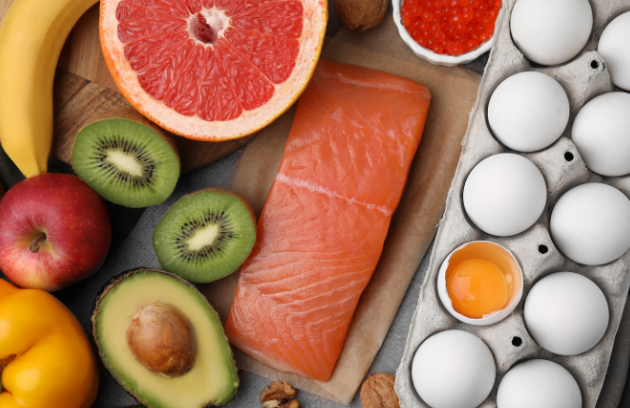Table of Contents
Introduction
Sperm health plays a crucial role in male fertility, directly impacting the ability to conceive. For those looking to improve sperm count and motility, diet can be a powerful ally. Certain foods are rich in nutrients that support healthy sperm production, boosting both the quantity and quality of sperm. This article explores the best foods to increase sperm count and motility, along with essential nutrients and foods to avoid for optimal reproductive health.
1. Understanding Sperm Health
Sperm health is measured by several key factors, including sperm count (the concentration of sperm in a semen sample) and motility (the ability of sperm to move efficiently). Good sperm health is essential for successful conception, as motility enables sperm to swim towards and fertilize the egg.
Healthy lifestyle choices, particularly a nutritious diet, can improve sperm count, motility, and overall fertility. For those seeking to boost their fertility naturally, focusing on diet is a proactive and effective approach.
2. Nutrients Essential for Sperm Quality
Before diving into specific foods, it’s helpful to understand which nutrients are essential for enhancing sperm count and motility:
- Zinc: Known as the “fertility mineral,” zinc is critical for testosterone production, sperm formation, and motility.
- Antioxidants (Vitamin C, Vitamin E, Selenium): Antioxidants protect sperm from oxidative stress, a major factor in poor sperm health.
- Folate: This B-vitamin plays a role in DNA synthesis and repair, contributing to sperm quality.
- Omega-3 Fatty Acids: Omega-3s improve blood flow to reproductive organs and support the structural health of sperm.
- Vitamin D: Linked to improved sperm motility, vitamin D is essential for overall reproductive health.
- L-Carnitine: This amino acid enhances energy production in sperm, which can improve motility.
By including foods rich in these nutrients, men can take a significant step toward enhancing sperm health.
3. Best Foods to Increase Sperm Count and Motility
Incorporating the right foods into your diet can improve sperm quality. Here are some of the best foods for boosting sperm count and motility:
3.1 Oysters
Oysters are packed with zinc, a mineral essential for testosterone production and sperm health. Just one serving of oysters provides the recommended daily allowance of zinc, making it a top food for boosting sperm count.
- Nutrient Highlight: High in zinc, essential for sperm formation and motility.
- Serving Suggestion: Consume oysters as a weekly treat for optimal benefits.
3.2 Dark Leafy Greens
Dark leafy greens like spinach, kale, and Swiss chard are rich in folate, a B-vitamin important for DNA synthesis and sperm quality. Folate deficiency can lead to low sperm count and poor motility.
- Nutrient Highlight: High in folate, supporting DNA health in sperm.
- Serving Suggestion: Incorporate leafy greens into smoothies, salads, or stir-fries daily.
3.3 Walnuts
Walnuts are a fantastic source of omega-3 fatty acids, which improve blood flow to reproductive organs and enhance sperm structure and motility. Additionally, they contain antioxidants that protect sperm from oxidative damage.
- Nutrient Highlight: Omega-3s and antioxidants for improved motility and structure.
- Serving Suggestion: Snack on a handful of walnuts each day or add them to oatmeal and salads.
3.4 Citrus Fruits
Citrus fruits like oranges, lemons, and grapefruits are high in vitamin C, an antioxidant known to protect sperm from oxidative stress. Vitamin C also helps increase sperm count and motility by reducing DNA damage in sperm.
- Nutrient Highlight: High in vitamin C for antioxidant protection.
- Serving Suggestion: Enjoy citrus fruits as a snack or add fresh lemon juice to your water daily.
3.5 Fatty Fish (Salmon, Sardines, Mackerel)
Fatty fish are high in omega-3 fatty acids, which improve sperm motility and enhance reproductive health. These fish also contain vitamin D, a nutrient associated with better sperm motility.
- Nutrient Highlight: Omega-3s and vitamin D for sperm motility and structure.
- Serving Suggestion: Aim to eat fatty fish at least twice a week for maximum benefits.
3.6 Pumpkin Seeds
Pumpkin seeds are rich in zinc and antioxidants, which are essential for protecting sperm and supporting healthy testosterone levels. They’re a convenient snack that can be easily added to various meals.
- Nutrient Highlight: High in zinc and antioxidants for testosterone support.
- Serving Suggestion: Sprinkle pumpkin seeds over yogurt, salads, or eat them as a snack.
3.7 Eggs
Eggs are a great source of protein, vitamin E, and choline—all important for protecting sperm from oxidative damage and supporting motility.
- Nutrient Highlight: Vitamin E and protein for sperm health.
- Serving Suggestion: Include eggs in your daily diet through breakfast or snack options.
3.8 Pomegranate
Pomegranates are rich in antioxidants that help combat oxidative stress, a factor known to impair sperm quality. Drinking pomegranate juice or eating fresh pomegranate can significantly improve sperm motility and quality.
- Nutrient Highlight: High in antioxidants for oxidative stress reduction.
- Serving Suggestion: Enjoy pomegranate juice or fresh pomegranate as a regular part of your diet.
3.9 Dark Chocolate
Dark chocolate contains L-arginine, an amino acid that helps increase sperm count and enhance motility. It’s also high in antioxidants, which protect sperm from cellular damage.
- Nutrient Highlight: L-arginine and antioxidants for sperm health.
- Serving Suggestion: Opt for a small serving of dark chocolate with 70% cocoa or higher.
4. Foods to Avoid to Increase Sperm Count and Motility
While certain foods can boost sperm count and motility, some foods may have a negative impact on sperm health and should be avoided or limited:
4.1 Processed Meats
Processed meats like bacon, sausage, and ham have been linked to lower sperm count and poor motility due to high levels of saturated fats and additives.
- Impact on Sperm: Lowers sperm quality due to unhealthy fats and chemicals.
- Recommendation: Replace processed meats with lean proteins like chicken or fish.
4.2 Sugary Beverages
Excessive consumption of sugary beverages, such as sodas and energy drinks, can lead to weight gain and metabolic issues, which are detrimental to sperm health.
- Impact on Sperm: Negatively impacts sperm motility and concentration.
- Recommendation: Opt for water, herbal teas, or fresh fruit juices instead.
4.3 Alcohol
Excessive alcohol intake is known to lower testosterone levels and decrease sperm production. Alcohol can also increase oxidative stress, which damages sperm DNA.
- Impact on Sperm: Reduces testosterone and increases oxidative stress.
- Recommendation: Limit alcohol consumption, particularly during fertility treatment.
4.4 Trans Fats
Foods high in trans fats, such as fast food, baked goods, and fried snacks, are associated with lower sperm count and motility. These fats contribute to poor cardiovascular health, which indirectly impacts reproductive health.
- Impact on Sperm: Lowers sperm count and motility.
- Recommendation: Avoid trans fats and choose healthy fats from nuts, seeds, and olive oil.
4.5 High-Soy Products
Soy products contain phytoestrogens, plant-based compounds that mimic estrogen. In excessive amounts, these compounds may interfere with testosterone levels, impacting sperm production and motility.
- Impact on Sperm: Can disrupt hormone balance when consumed in excess.
Recommendation: Consume soy in moderation and choose other plant-based proteins like beans and lentils.
Conclusion
Improving sperm health naturally through diet is a simple and effective way for men to boost their fertility. By focusing on nutrient-rich foods like oysters, leafy greens, walnuts, and citrus fruits, and avoiding processed foods and excessive alcohol, men can significantly improve their sperm count and motility. Including these foods and eliminating unhealthy choices supports reproductive health, making it easier to achieve the goal of conception.

